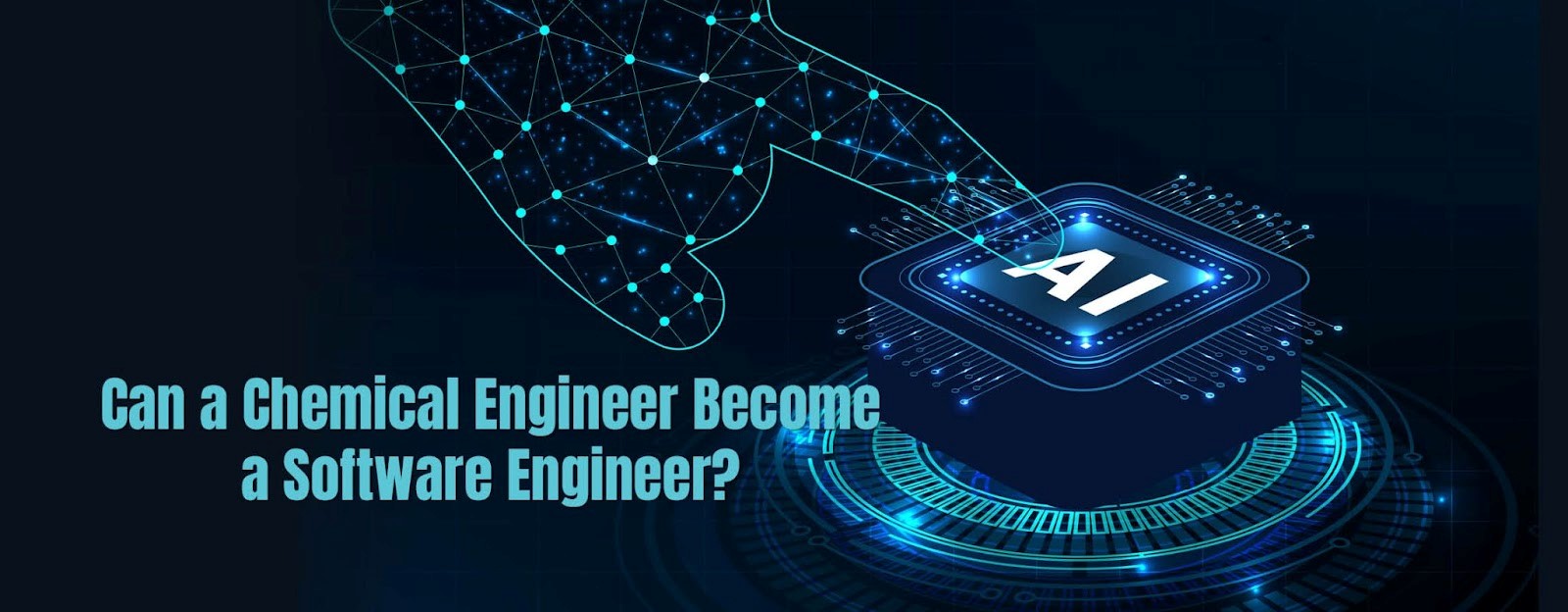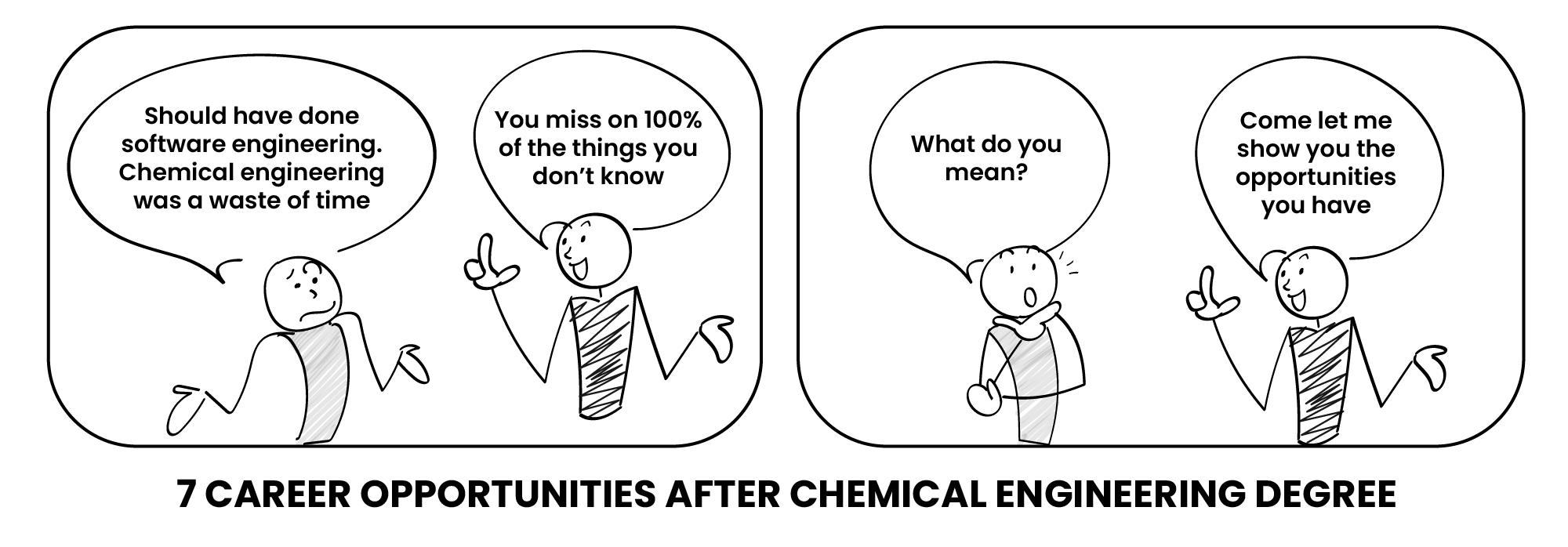
We are confused about many career options in this era of confusing career choices. Even if we choose engineering as a career option, we are confused about which branch to choose.
At times, even if we choose a different career, we might end up with a job that doesn't excite us, and we wish we could change what we do. Many people want to switch jobs within the field of engineering.
Let's put some light on switching from chemical engineering to computer science.
Transition from Chemical Engineer to Software Engineer
If you’re looking for an answer to the question, Can a chemical engineer become a software engineer? This blog is for you. In this blog, we will guide you to transform your career and explore the skills, challenges, and opportunities for your way to success in computer engineering.
First, what skills do you have in your bank that you have acquired during chemical engineering?
The mindset should be to utilise those skills in developing the ones needed for computer engineering. So let’s begin….
1. Use Chemical Engineering Expertise
Chemical engineers are equipped with an analytical mindset, a skill crucial in software development. The ability to break down complex problems into easier components is a unique skill, making you a solid candidate for transition.
Problem-Solving Skill
One of the traits of a chemical engineer is their problem-solving skills. This skill smooths your transition into the software engineering domain, where identifying and rectifying bugs, optimising code, and troubleshooting are everyday challenges.
Process Optimization in Software Development
Chemical engineers are very good at optimising processes, a skill easily transferable to software development. It can be used in code deployment and streamlining development workflows.
2. Master Algorithmic Thinking
Software engineering is fundamentally algorithmic. Chemical engineers can use their mathematical powers to understand and implement algorithms efficiently. Platforms like HackerRank and LeetCode provide an excellent playground for learning these skills.
Coursera
Learn to code with me
Enjoy Algorithms
Learning.com
3. Get Into Web Development
Learning web development is a strategic move for those eyeing a career in software engineering. Learning front-end technologies like HTML, CSS, and JavaScript broadens the skill set and enhances the adaptability of a transitioning professional.
4. Networking and Mentorship
Building a network within the software engineering community is a very important step. Engaging with forums like GitHub and participating in coding communities will allow you to collaborate. You can seek mentorship in these communities, too.
5. Continuous Learning
The most important thing of all is that you should have a flexible and continuous Learning Mindset. Transitioning from chemical engineering to software engineering demands a commitment to continuous learning. The tech industry evolves daily, and staying updated on emerging technologies and industry trends is very important.
10 Places to learn Programming and Coding for FREE
What Else Can You Do?
Many people in India often opt to pursue a Master's degree or take a conversion course in software development while still in college. After completing your bachelor's degree, you can choose to do a one-year Master's program to gain fundamental knowledge in software development.
More and more people are teaching themselves how to code. In the tech world, companies care more about your work experience and references than whether you have a Software Engineering Degree. This means that bright minds who didn't do software engineering can still do well in the industry.
But going the self-taught route takes a lot of time and dedication. You have to be disciplined and organised in how you approach it.
Believe you can have a seamless transition
Can a chemical engineer become a software engineer? The answer is yes, and it fills you with many opportunities. If Chemical Engineers can use their analytical skills, develop coding proficiency, and commit to continuous learning, they can successfully walk through this transformative path. With a keen eye for detail, chemical engineers are well-suited for quality assurance and testing roles. Also, the data-centric nature of chemical and software engineering brings them into the world of Data Science.

A Chemical Engineering degree opens up the doors to a lot of exciting and well-compensated career opportunities. In this blog, we'll explore seven diverse career prospects for those who are exploring opportunities after a Chemical Engineering Degree and look at the key skills required, salary expectations, and prominent recruiters in each field. We'll also explore Chemical Engineering salary trends and sectors, along with identifying the prime cities for employment.

Environmental engineers work on projects related to environmental protection, pollution control, and sustainable practices. Exploring opportunities after a Chemical Engineering Degree, graduates can find employment in government agencies, consulting firms, and industries with a strong focus on environmental compliance, offering promising career prospects.
The number of jobs for environmental engineers is forecasted to grow by 8.3% by 2026. There are projected to be about 4,000 openings on average every year for professionals in this field.*
Communication skills are needed to be an environmental engineer so that they can explain plans, specifications & findings. Environmental engineers apply various mathematical concepts, including calculus and trigonometry, in their tasks involving analysis, design, and problem-solving.
The salary for Environmental Engineers in India spans from ₹1.8 Lakhs to ₹9.5 Lakhs, with an average yearly income of ₹4.0 Lakhs.**
**Source - Ambitionbox
*Source - IndiaToday
Energy engineers work to optimise energy consumption and efficiency in various industries. They may be involved in designing energy-efficient processes and systems or working on renewable energy projects. Producing electricity is a sign of a developed country. India is moving toward cleaner ways of making power, like wind and solar. Right now, we have 73 GW of clean energy, but we can have 363 GW. So, being an energy engineer in this field is a good career choice.*
In energy engineering, smart thinking can help you find clever solutions when faced with problems. Depending on your job, you might also need skills like good communication, management skills, and knowledge about energy markets and industry trends.
The salary of an Energy Engineer in India can be anywhere from ₹1.8 LPA to ₹9 LPA, and the typical yearly salary is around ₹3.5 LPA.**
**Source - Ambitionbox
*Source - idreamcareer
Adopting this role could be the best opportunity after chemical engineering. These engineers focus on developing new products or improving existing ones. They work closely with research and development teams to create innovative products. Chemical engineers are really good at creating new products because of their strong education, analytical thinking, systematic approach, and problem-solving skills.
As a product developer, it's crucial to possess a solid grasp of both the creative and technical aspects of product development. Key skills for success in this role include creativity, effective problem-solving, good attention to detail, and excellent communication abilities.
The salary for Product Development Engineers in India can vary from ₹2.0 Lakhs to ₹14.0 Lakhs.*
Top Recruiters
Mercedes Benz Research & Development India
*Source - Ambitionbox
One of the best opportunities after chemical engineering is to be a chemical plant manager. The job of a chemical plant manager is to oversee the day-to-day operations of chemical manufacturing facilities, ensuring safety, efficiency, and compliance with regulations.
Key skills needed - Organisation and managerial skills, supply-chain knowledge
The projected growth rate for all industrial production managers from 2020 to 2030 is expected to be 5%. *
Salary - The salary range for Plant Managers in India, with under 5 years of experience up to 26 years, spans from ₹6.0 LPA to ₹50.0 LPA.**
**Source - Ambitionbox
Process engineers work to design, optimise, and oversee manufacturing processes in industries such as pharmaceuticals, petrochemicals, food and beverage, and more. If you start working as a process engineer you’ll work in either one of these industries - agriculture, lifestyle, chemical, energy, infrastructure and health care. As India's manufacturing sector expands, so do opportunities for product development engineers. The Indian Brand Equity Foundation (IBEF) projects that by 2025, India's manufacturing sector will reach US$1 trillion*, accounting for a quarter of the country's GDP.
To be a good process engineer, you need to know your way around machines and be familiar with software like AutoCAD, MATLAB, and SOLIDWORKS. Good communication skills are also vital for working well with the management.
In India, the salary for Process Engineers typically varies from ₹2.0 LPA to ₹10.2 LPA, and the average annual salary is around ₹5.8 LPA.*
Top Recruiters
**Source - Ambitionbox
*Source - Indian Brand Equity Foundation
Engage in the extraction of oil and gas, employing the principles of chemistry and geology to extract natural resources from beneath the Earth's surface. They also handle the chemicals derived from gas, coal, and petroleum. According to the Ministry of Petroleum and Natural Gas, the Chemicals and petrochemicals demand in India is expected to nearly triple and reach USD 1 trillion by 2040”*
Petroleum engineers in India need to be sharp in different areas. They have to carefully plan drilling operations, thinking ahead to avoid problems. They also need to be creative, finding ways to get oil and gas from new places. Math skills are a must, using advanced math for designing and fixing things in the oil industry.
The annual salary of a Petroleum Engineer in India typically falls in the range of ₹2 LPA to ₹20.4 LPA, depending upon the experience with an average yearly income of ₹4.3 LPA.**
Top recruiters
Bharat Petroleum
Indian Oil Corporation
*Source - Ministry of Petroleum & Natural Gas
**Source - Ambitionbox
To become a professor in college, a candidate must complete his Master’s degree in Chemistry or Chemical Engineering and clear the state and national level entrance exams. In order to become a professor at renowned engineering colleges, it is advisable to pursue an MTech degree in chemical engineering, ideally followed by a PhD.
The ideal candidate should be someone with good professional values, great people skills, and excellent spoken and written communication abilities. Should be able to build a strong research program, and teach both undergraduate and graduate courses effectively.
In India, the salary for a Chemical Engineering Lecturer can vary from ₹1.8 LPA to ₹30.0 LPA, with an average annual salary of ₹10.0 LPA. The Department of Higher Education, MHRD, Govt. of India has issued the minimum entry-level Professor salary in India to be Rs. 1,44,200 per month under UGC guidelines. * In addition to the basic pay, Professors will also receive academic grade pay of Rs. 10,000 as per Academic Pay-Level 14 along with additional perks & allowances like DA, HRA, medical insurance, post-retirement benefits,* etc. Top universities in India, such as IITs, IIMs, NITs, VIT Pune, Delhi University, NIFT, Christ University, and Symbiosis, offer higher salary packages.
*Source - testbook.com
Sectors for chemical engineers
Oil & Gas Companies
|
Sector |
Average Salary |
|
Petroleum (Oil & Gas) |
₹ 7 LPA |
|
Power & Energy |
₹ 6 LPA |
|
Pharma |
₹ 5.6 LPA |
|
Fertilizers |
₹ 4.8 LPA |
|
Refrigeration & Air Conditioning |
₹ 4.5 LPA |
(Make an infographic for this)
(Source - College Duniya)
Delhi - with a mix of industrial, research & government sectors. Chemical engineers earn an average of INR 12 LPA
Bangalore - “Silicon Valley of India” - The Technology Hub. The sectors mainly focus on electronics, software, and biotechnology. In Bangalore's high-tech environment, chemical engineers can earn annual salaries of up to INR 12 LPA, showcasing the city's competitive compensation opportunities.
Kolkata - The historical significance and growing industries, present opportunities for chemical engineers in sectors like manufacturing & research. Salaries in Kolkata typically range up to INR 9.2 LPA.
Mumbai - Chemical engineers in Mumbai earn different yearly salaries, with the average usually around INR 7.8 lakhs, depending on their experience and the industry they work in.
Chennai - In Chennai, professionals in the field of chemical engineering typically receive an annual salary of INR 6 lakhs. The city's robust industrial growth maintains a continuous need for individuals skilled in process optimisation and research.
Hyderabad - Hyderabad has a growing pharmaceutical and biotechnology industry, providing job opportunities for chemical engineers in research and development, quality control, and process development. Salaries in this sector can range from INR 4 to 8 LPA.
Pune - Along with the pleasant weather, the presence of chemical and automotive industries, makes it an attractive destination for chemical engineers. Entry-level salaries can range from INR 3 to 6 LPA.
Source: (Naukri.com)
Conclusion
Getting a degree in chemical engineering opens up a wide range of great career choices in different fields, and they usually come with good pay. There are also some interesting government job options. You can even explore other careers like biotechnology and food science. If you continue your education and get some extra certifications, you can make your job prospects even better. Chemical engineering is a flexible and valuable field with lots of chances for success.
666, Upper Indiranagar, Bibwewadi,
Pune, Maharashtra, INDIA - 411 037.
For Admission :- 91 - 7058432258 / 8793428634
For Admission :- Office Timing :-
Monday to Friday - 10am to 5 pm